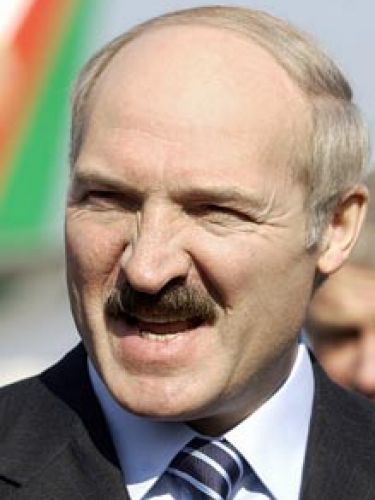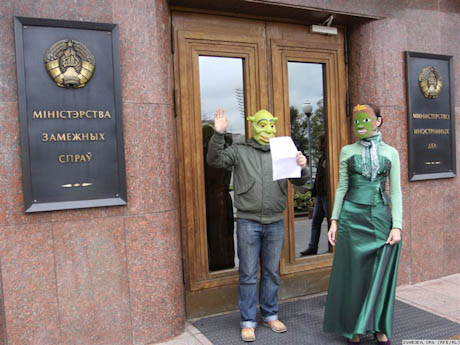On 22 September civic activists and journalists organized a satirical happening in Minsk.
Politicized fairy tale
Dressed as characters from popular cartoons, activists submitted yet another address to the Belarusian Ministry of Foreign Affairs with a request to abort the criminal prosecution for activities of unregistered organisations. The happening was a part of the Stop 193.1! campaign. A very similar in spirit event was organised last year, when Santa Clauses were petitioning for the same cause.
 According to the script, the main antagonist of the event Lord Farquaad, acting in a similar vein as the Belarusian authorities, issued a decree. By his decree the fairy-tale dictator announced how people and creatures should live: never gather together, not to do anything jointly, and go into a marshland exile. However, animals decided to disobey this decree and went to defend their right on behalf of an unregistered organization.
According to the script, the main antagonist of the event Lord Farquaad, acting in a similar vein as the Belarusian authorities, issued a decree. By his decree the fairy-tale dictator announced how people and creatures should live: never gather together, not to do anything jointly, and go into a marshland exile. However, animals decided to disobey this decree and went to defend their right on behalf of an unregistered organization.
The satirical happening was a response to the authorities’ inaction. Over the last year officials from the Ministry of Justice and MPs numerous times had expressed their opinion that criminal prosecution for activities on behalf of unregistered organizations should be abolished. Yet no concrete steps had followed. That was why fairy-tale characters handed another appeal with a request to cancel the article, which brutally violates the freedom of association.
“Try on their own”
O n September 15 the Belarusian MFA had sent a document to the UN, which stated that the authorities see no problems with human rights in Belarus. This document further stipulated that “Belarus does not accept recommendation concerning the abolition of Article 193.1 from Criminal Code. This article is instrumental in preventing activities of extremist groups and organizations in the country…”
n September 15 the Belarusian MFA had sent a document to the UN, which stated that the authorities see no problems with human rights in Belarus. This document further stipulated that “Belarus does not accept recommendation concerning the abolition of Article 193.1 from Criminal Code. This article is instrumental in preventing activities of extremist groups and organizations in the country…”
The happening with fairy-tale characters was held on the eve of the 15th session of the UN Human Rights Council, which was scheduled for 23 September. A final document with an evaluation of the human rights situation in Belarus was meant to be approved at this session.
 The President of Belarus, Aliaksandr Lukashenka, right, also denied any problems with human rights in the country. Not long ago, he made another sonorous comment on the topic. The President “is not going to interfere with the process of political parties’ development and civic organizations’ creation.” His statement that “organizations should try [to work] on their own” without the state support gave some hope for improvements.
The President of Belarus, Aliaksandr Lukashenka, right, also denied any problems with human rights in the country. Not long ago, he made another sonorous comment on the topic. The President “is not going to interfere with the process of political parties’ development and civic organizations’ creation.” His statement that “organizations should try [to work] on their own” without the state support gave some hope for improvements.
However, in the same speech, Lukashenka hurled remarks at international organisations. [There is] “no need to invent and try to give us suggestions from abroad on what civil society in Belarus should look like,” he said. It seems that hopes for any improvements will remain only in words but not in real actions of the Belarusian regime.
Katsiaryna Klimko, based on nn.by, charter97.org





